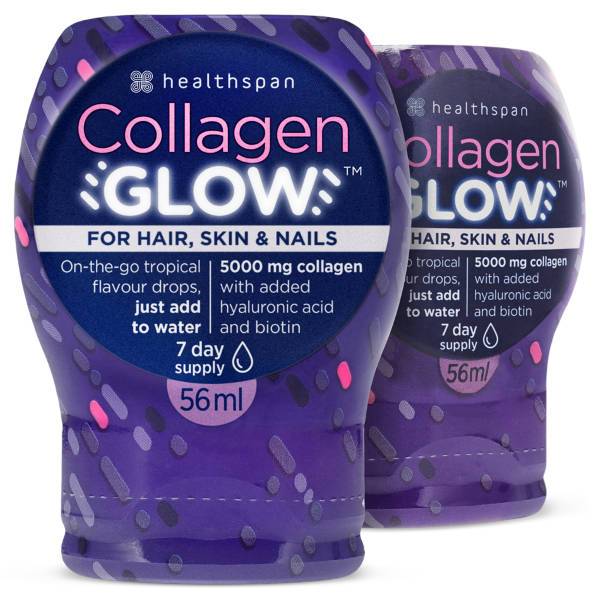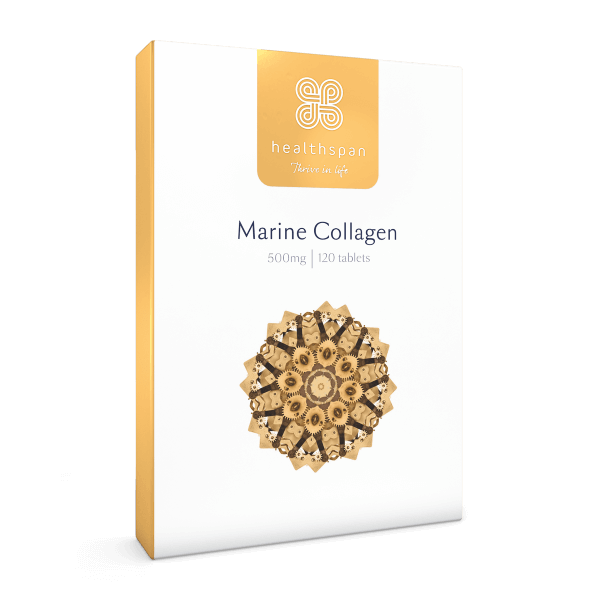Collagen provides vital structure and support for your skin, joints and bones.
🕒 3 min read
Collagen is the main structural protein in the body, providing the scaffolding for youthful skin, cartilage, tendons, ligaments and other tissues. Although collagen can be obtained from eating meat and fish, collagen supplements are becoming increasingly popular, and provide the amino acids that stimulate the synthesis of collagen.
What is collagen?
Collagen is a protein made up of long chains of amino acids, which are linked to almost every bodily process. There are at least 28 types of collagen, three of which, known as types I, II and III, are particularly important in determining the structure, shape and strength of body tissues.
Type I collagen is found in your skin, bones, teeth, tendons and ligaments (type III is also found in tendons and ligaments), while type II is found in your joints.
Although all collagen contains the amino acids glycine, proline, hydroxyproline and hydroxylysine, each type of collagen has a different structure.
Collagen chains twist around each other to form strong, rope-like triple strands that bind together; these then form strong fibres that resemble a twisted rope. Cross-linking binds these fibres together, forming a strong network that can trap other molecules, such as chondroitin (important for joint health) and hyaluronic acid (vital for plump, elastic skin), for improved elasticity and flexibility.
The word collagen derives from the Greek word for glue, kólla, describing how it holds everything together.
What does collagen do?
Collagen literally binds us together and, as well as being found in tendons, ligaments, cartilage, bones and blood vessels, it is key to maintaining youthful, plump, well-hydrated and elastic skin.
The female hormone oestrogen stimulates the production of collagen and, as levels fall around the time of the menopause, so does collagen formation. The collagen that's present also becomes increasingly tangled, so skin loses its resilience and elasticity and becomes drier. Studies have shown that collagen supplementation can reduce wrinkles and increase skin elasticity, hydration, radiance and firmness.

Collagen GLOW
Tasty tropical collagen drink
- 5000mg type I and type III marine collagen
- Give your hair, skin & nails a beauty boost
- Simply squeeze into water, stir and enjoy!
How does it benefit joint health?
Studies in people with osteoarthritis have shown that collagen supplementation can help to maintain the structure of the joints and reduce pain and stiffness. Athletes can also benefit, and research in this area has shown that athletes who took collagen supplements significantly improved their joint mobility and reduced their joint pain at rest, as well as when walking, standing, running, lifting or carrying weights. They were also able to exercise longer and recover faster.
Typically, 500mg to 20g daily. Higher doses are usually stirred into water to make a drink.
What about collagen supplements?
The different types and sources of collagen can make supplementation confusing. Types I, II and III are found in powder, capsule or liquid form; it is unusual to find other types of collagen as a supplement.
Collagen supplements can be derived from animal cartilage (typically chicken or cow) or hide (cow), providing type II and type III collagen, or from marine sources such as fish, which contain 100 per cent type I collagen.
Look for the right kind of collagen for your needs, as type I is best for skin and type II best for joints.
Marine collagen is one of the most popular sources, as it provides a higher concentration of the amino acids needed for the production and repair of our own cartilage. Supplements can contain collagen in its original form (unhydrolysed), which must be broken down during digestion before it can be absorbed, or a popular form known as hydrolysed collagen, which is pre-digested by protease enzymes to release small fragments (peptides) that are more readily absorbed.
You should also look for collagen supplements with added vitamin C, as this is crucial for the process of collagen formation.

Marine Collagen
Support for your skin, bones and joints
- High levels of hydrolysed marine collagen
- Low molecular weight to aid absorption
- Added vitamin C to support collagen formation






